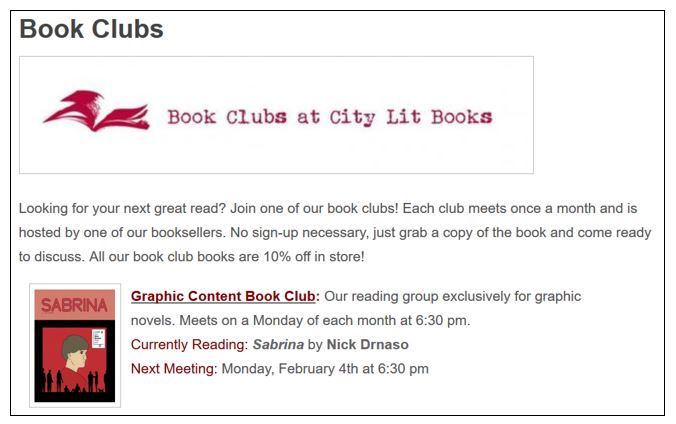One of the most powerful ways that a bookstore can compete with digital retailers is by providing something that the algorithm can’t – community. Bookstores host author talks, children’s storytime, and more. Many bookstores also host book clubs as a way to bring in new customers and to cultivate a vibrant atmosphere.
Some publishers are already working with bookstore-based book clubs and learning about their needs, but we hope that more will take the time to cultivate relationships with indie bookstores through their book clubs.
These bookstore book clubs draw in new readers who become regular customers and active members of the community. Book clubs help readers find out about new genres and new authors that they may not have been previously exposed to, with picks curated by experienced readers. For example, Bella De Soriano joined City Lit’s Graphic Content book club in Chicago because she saw a flier while she was shopping. She wasn’t a big graphic novel or comic reader before but saw it as an opportunity to expand her reading horizons and get connected to some of her neighbors.

When indie bookstores have to compete with the ease and convenience of online retailers, being able to create in-person points of connection is crucial. According to City Lit owner Teresa Kirschbraun, the bookstore’s book club programming has resulted in not only friendships outside of the clubs, but an engagement!
In addition to fostering community, these book clubs help stores gain more loyal customers and build a more dynamic events calendar. Some of the other book clubs at City Lit include the Wilde Readers Book Club for LGBTQ lit, Found in Translation, Women Write Books, Weird and Wonderful Book Club for speculative fiction and fantasy, the Subject to Change Book Club featuring coming-of-age stories, and more. City Lit encourages book club members to purchase through their store by providing a discount to members who have an account with the store.
While many privately-run book clubs function as social gatherings as well as literary ones, book clubs that operate in bookstores are a different beast. Often, they have clear leaders and facilitators who are, in most cases, booksellers themselves. Since joining the Graphic Content book club, De Soriano has taken over some of the organizing of the club. This includes purchasing copies for the book club members and working with City Lit to schedule meeting dates.
Book club leaders think and talk about books for a living, so their relationship to book club picks looks a little different from “civilian” book clubs. They are more plugged into the wider publishing industry, with better understanding about trends that readers are enjoying and knowledge of new titles on the horizon.
Book club leaders at City Lit find titles using industry tools like book awards, as well as keeping tabs on releases from publishers whose work they already like. Kirschbraun explains, “For Found in Translation, [the leader] will review information from publishers of translated books, [like Open Letter Books and New Directions Publishing]. She also looks at other translations by favorite translators. Other booksellers rely on lists of books that have been longlisted or won awards. Some review modern canon lists. For Women Write Books, the book club leader finds lists of diversity such as women of color or queer women authors.”
Additionally, bookseller-led book clubs tend not to use reading guides. Book club leaders at City Lit look for interviews with the author, book reviews, and find coverage from news media such as Bustle or Huffington Post.

Cosmo Bjorkenheim, who leads the NYC History Book Club at McNally Jackson’s Williambsurg location, agreed. “Mostly any outside material has been supplemental, like an exchange of letters between Robert Caro and Robert Moses right after the publication of The Power Broker, an open letter from Jane Jacobs to Michael Bloomberg from 2005, some maps, some movie clips… Bibliographical information is often useful, as are footnotes and indices. These are helpful for digging deeper into topics mentioned in a book but not elaborated upon.”
While Bjorkenheim does not currently work with any publishers directly for his book club, he hopes to do so for the next book club that he and his colleague will host, the Movie Adaptation Book Club. Interested publishers can email him at Cosmo@mcnallyjackson.com. “We plan on structuring this club a little more carefully, with screenings scheduled between meetings and some kind of thematic arc guiding the readings. There will be more of an emphasis on supplemental materials and something like a “lesson plan” for each meeting.”
Kirschbraun has made a point to tell her reps from publishers about the book clubs at City Lit so that the reps can suggest upcoming books that might suit the booksellers’ and the clubs’ interests.
Check out these other bookstores with robust bookclub programming:
- Boulder Book Store
- WORD (We heard from the leader of the Romance Book Club in our recap of PAMA’s Lunch with the Book Club Gatekeepers last year!)
- King’s Bookstore
- Avid Bookshop
- Odyssey Bookshop
- The Last Bookstore
We hope that more publishers will make an effort to get to know the book clubs that exist in the bookstores they work with. Talk to the leaders, learn what kinds of titles their members are most interested in and what sorts of supplemental information would make for a richer discussion.
